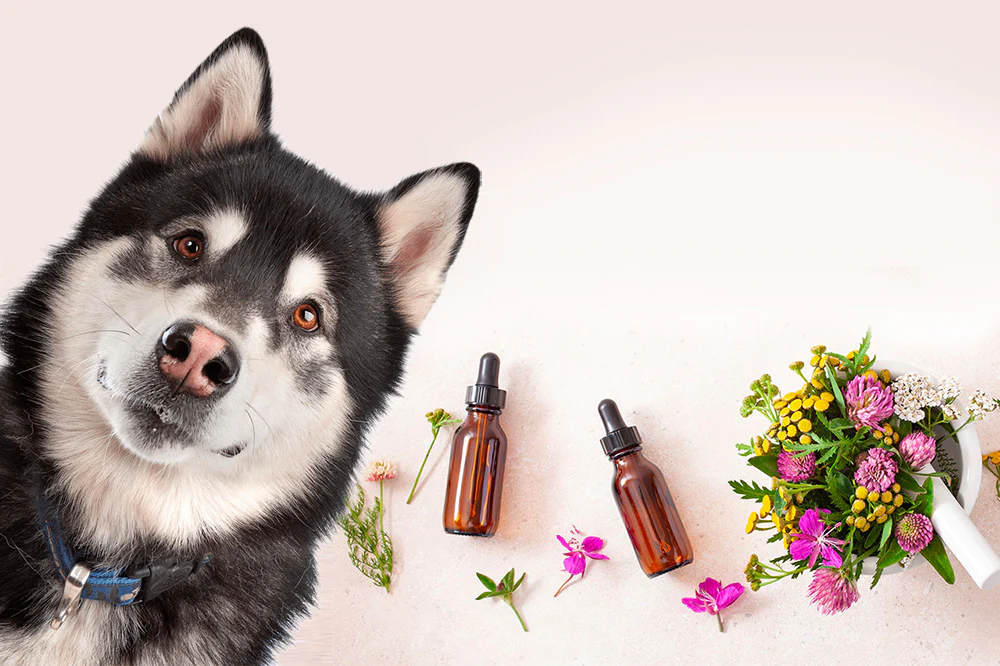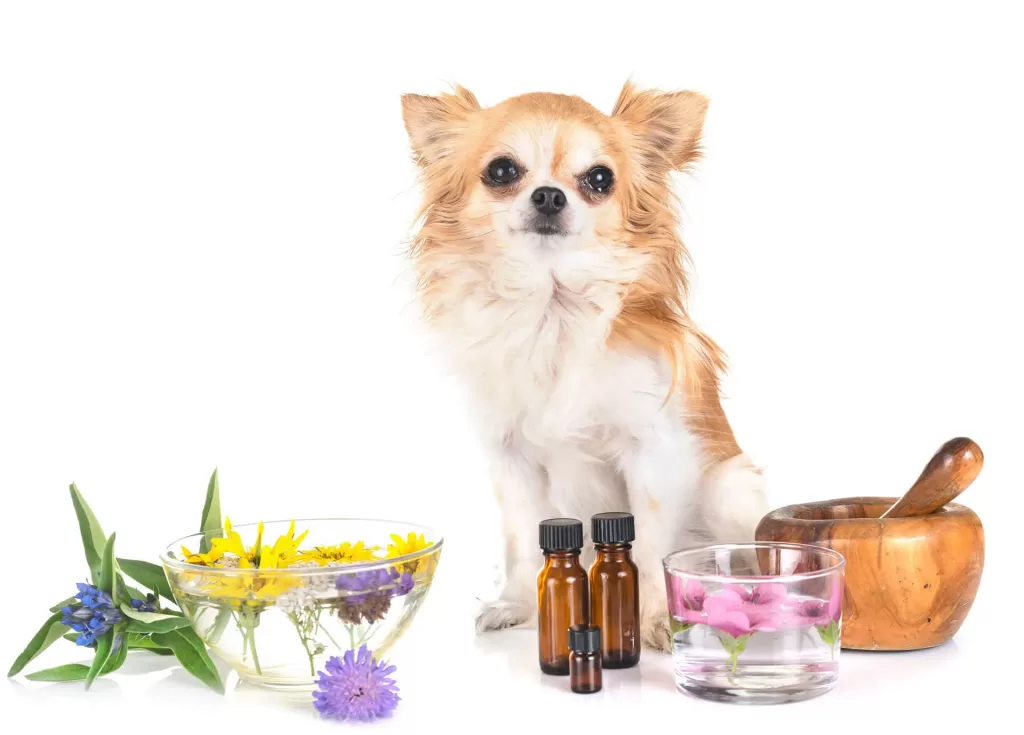Aromatherapy for dogs: Aromatherapy has been used to treat humans for centuries, and recent studies have shown that it can also be very effective in calming down dogs. If your dog is anxious or stressed, using aromatherapy may help him feel more at ease.
Table of Contents
There are many different types of aromatherapy oils that can be used on dogs, so find one that your dog likes and experiment a little to see what works best for him
What exactly is aromatherapy?
Aromatherapy is an effective technique that is widely popular in Kerala, the State of India, where people use oil to treat and relax the mind and well-being of a person.
Essential oils here are you can consider are volatile liquids that contain an aromatic scent and can be found in the rind, flower, leaf, stem, root, wood, bark, or resin of aromatic plants. Essential oils can be extracted from aromatic plants by distillation, expression, CO2 extraction, or solvent extraction. Fragrance oils are not therapeutic and are instead created through a synthetic process.
Also Read: Dog Zoomies: 8 Things to Know About Dog Zoomies
How exactly can one benefit from aromatherapy?
There is a theory that the olfactory bulb is linked to the limbic system, which is where emotions, memories, and learnings are stored, smell has been described as having “memoiristic” qualities.
The lungs (via inhalation) or the skin are the entry points for odor molecules into the bloodstream (topical application).
Lavender is chemically sedating and has an influence on the central nervous system. In addition to the memorization connection, there is also a physiological response.
Is it okay to use aromatherapy on dogs?

The straight answer is no! but aromatherapy for dogs is purely a natural treatment that does not harm any creature, whereas high concentration or the purest form of oils must not be used on dogs.
The first step toward safety is to dilute. Essential oils that are extracted in their purest form are extremely concentrated; it takes around two hundred pounds of lavender flowers to produce one pound of lavender essential oil.
There are some businesses that recommend applying undiluted essential oils directly to the skin, but doing so is definitely not a good idea.
It is also not necessary because a single essential oil or combination containing 1 percent (or less) of active ingredients is often helpful for dogs.
Essential oils that have been diluted can be used as remedies to avoid overstimulation of your dog’s sense of smell, irritation of the skin or mucous membranes, and sensitization. In addition, dilution minimizes the over-harvesting of valuable plant resources.
Aromatherapy for dogs can be a simple natural solution that, when used appropriately, can help create an environment that is calmer, soothe itchy or irritated skin, quiet digestive disturbances, repel insects, and heal infections.
It can strengthen the link between humans and animals make it easier to modify behaviors, and make people healthier.
How Aromatherapy Helps Dogs (and Other Animals)
Aromatherapy focuses on the limbic system of the brain, which is the part of the brain that is in charge of regulating emotions and mood. Because of this, many individuals turn to aromatherapy as a means of combating negative emotions such as worry, wrath, fear, tension, and a wide variety of others.
There are two methods for utilizing essential oils, the first being inhalation through the nose, and the second being absorption through topical application. It does happen on occasion, but ingesting essential oils is not a method that is utilized very frequently at all. Most of the time, essential oils are applied topically.
Here’s a chart outlining some common aromatherapy for dogs that benefits in calming your dogs:
| Aromatherapy Oil | Benefits |
|---|---|
| Lavender | – Relieves anxiety and stress |
| – Promotes relaxation and sleep | |
| – Soothes skin irritations and itching |
| Aromatherapy Oil | – Reduces hyperactivity and restlessness |
|---|---|
| Chamomile | – Calms nervousness and anxiety |
| – Eases digestion problems and stomach upset | |
| – Reduces inflammation and skin irritations – Reduces hyperactivity and restlessness |
| Aromatherapy Oil | Benefits |
|---|---|
| Valerian | – Acts as a sedative and promotes relaxation |
| – Helps alleviate separation anxiety | |
| – Reduces fear and phobias – Relieves muscle pain and discomfort |
| Aromatherapy Oil | Benefits |
|---|---|
| Frankincense | – Relieves anxiety and stress |
| – Promotes feelings of tranquility and peace | |
| – Supports the immune system |
| Aromatherapy Oil | Benefits |
|---|---|
| Sweet Orange | – Uplifts mood and reduces anxiety |
| – Eases nervous tension and restlessness | |
| – Helps with motion sickness and nausea |
| Aromatherapy Oil | Benefits |
|---|---|
| Ylang Ylang | – Calms anxiety and nervousness |
| – Promotes relaxation and stress relief | |
| – Helps with insomnia and sleep disorders |
The effects of essential oils might vary depending on which mixture is utilized, however, some of the more common effects are listed here.
- Anti-fungal
- Anti-inflammatory
- Anti-microbial
- Anti-viral
- Calming
- Diuretic
- Energizing
- Pain-relieving
- Keeping insects at bay
- Rejuvenating
- Sedating
Dogs with nervous personalities typically suffer through a great deal of stress, particularly when they are forced to participate in activities that require them to be in public places, interact with a large number of people, or listen to loud sounds (e.g. fireworks, loud music, etc.).
After a long and stressful day, the use of aromatherapy helps people feel more at ease and relaxes them completely.
Aromatherapy has been known to assist with a number of issues, in addition to helping anxious dogs relax, including the following:
- Aggressive behavior
- Unhealthy breath
- Insects that can fly (e.g. flies and mosquitos)
- Joint troubles (e.g. arthritis, growing pains)
- Nervousness
- Parasites (e.g. ticks and fleas)
- A sense of being set apart
- A feeling of unease
Aromatherapy is also helpful for preventative health maintenance, particularly when it comes to maintaining the health of a dog’s liver, immune system, or gastrointestinal tract.
Because dogs have a more acute sense of smell than people do, inhaling essential oils causes their effects to be distributed throughout their circulation much more rapidly. Because of this, aromatherapy can have a rapid effect on canine patients, which is one of the reasons why it is effective in the treatment of certain illnesses.

